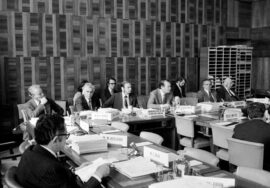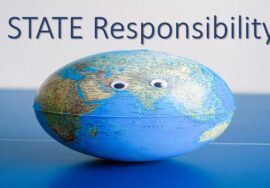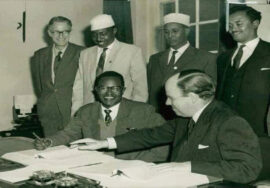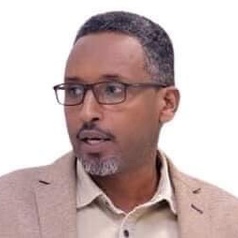
Analysis reaction to the JSL-FGS Talks in 2012-2015
Analysis reaction to Muhumed M Muhumed independent researcher The JSL-FGS Talks in 2012-2015
Somaliland entered the rabbit hole of the 2012 London Conference on Somalia by agreeing to meet with the TFG, referred to as Somalia. The Republic of Somaliland has been reduced as de facto status, contradicting its history of independence from the UK on June 26, 1960. The international community is to blame for Somaliland’s predicament; they know full well that two states merged in 1960, making the claim of Somalia as the parent state illogical. Both countries should be depicted as equals in the framing of the talks; secession should not be a topic. Therefore, Somaliland and Somalia must negotiate a solution, as their current path leads nowhere.
Evidence shows six rounds of talks between Somaliland and Somalia’s federal government took place in London, Dubai, Ankara, Istanbul (twice), and Djibouti. The people of Somaliland are still facing hardship as a result of their politicians’ decisions throughout the 20th and 21st centuries. Initially, Somaliland’s politicians lacked the negotiation skills needed to engage with Somalia adversaries.
1. Introduction
In the introduction, Muhumed presented the case like this:
1. Former British Protectorate Somaliland gained independence 26th June 1960
2. There is no Italian Somaliland but let’s called this UN trusteeship Italian rule Somalia gained independence 1st July 1960
3. Contested illegal union happened in 1st July 1960 as Somali Republic
The population and politicians of Somaliland faced challenges in 1960, and a military coup failed in December 1961 during a referendum that was manipulated by the Somalia elite of SYL and their parliament. The union was not recognised as an international treaty. Consequently, Somaliland’s case is unparalleled; its JSL politicians were unable to reinstate their past independence. Somaliland’s leaders are unbelievably lacking in political skills. Somaliland is definitely not a de facto state!
4. A group of international scholars claimed that when Siyad Barre took over Somalia in a military coup on 21 October 1969, Somaliland became a de facto state in legal terms. Since I’m not a legal expert, I assume that’s what they are referring to in Somalia:
– Somalia rejecting their forced referendum with Somaliland and union acts, including the constitution of 1960s, that make Somalia the first secessionist and Somaliland out of the ill-fated union.
5. After a 30-year long union, the central government of Somalia collapsed in 1991 when armed rebel groups ousted the late military regime: correct statement!
6. On 18 May 1991, the people of the former British Somaliland declared that they broke away from the rest of the country and restored their independence and hence, become a country known as “The Republic of Somaliland”.
– That above statement is ambiguous because Somalia’s collapse as a state, and Somaliland’s subsequent merger in the 1960s, invalidates the original agreement. Consequently, Somaliland’s move in 18th May 1991 wasn’t secession, but rather a reclaiming of its independence.
7. In 2001, Somaliland held a referendum on a draft constitution that affirmed Somaliland’s sovereignty and independence and 97.1% of the voters voted in favour of the constitution: correct statement.
8. The international community’s labelling of Somaliland as a de facto separate state requires Somaliland’s politicians need to engage internationally, rather than impose a narrative secessionism roadmap on its people and abusing the historical legality of the Republic of Somaliland.
9. However, Somalia opposed all these decisions and considered it unilateral and then illegal steps and repeatedly adhered to its territorial integrity:
– Since Somalia collapsed in 1991, there was no single entity to take unilateral action. In the 1990s, Somalia was controlled by warlords, with no effective opposition to challenge the 1960 union’s illegitimacy. In addition, Somalia has absorbed a sovereign state that was previously independent after the people of Somaliland refused to accept their referendum, union agreements, and constitution. It took Somaliland 31 years to assert their independence and demand Somalia to leave.
– The term territorial integrity (utis possidetis juris) is used pre-existing administrative boundaries of the area at the time of its independence and Somaliland and Somalia have different boundaries during their independence and Somalia cannot used it this term their fight against Somaliland.
– The current ruler ex-warlords of Somalia’s claims of illegality are absurd; Somalia actions against Somaliland since the 1960s are baffling..
10. Above all, Somaliland did not get international recognition from a single nation as well as the regional and international organizations such as the African Union, the Arab League, the Organization of Islamic Cooperation (OIC) and the United Nations which reiterated in their resolutions the unity and territorial integrity of Somalia.
– Somaliland’s failure to regain international recognition by restoring its independence of the 26th June 1960 stems from its leaders’ inadequate political skills and lack of expertise in international law by stating that Somaliland independence at 18th May 1991 instead calling the “Liberation Day”. Just like the fate of the Somalilanders in the 1960s, the politicians of Somaliland attempted to achieve union without signing a proper international treaty, aligning themselves with Somalia’s unethical leaders. Somaliland Going through it again!
11. From then on, there were no direct negotiations between the two parties and they both emphasized that their positions are unnegotiable and their constitutions support this notion.
– Somaliland is on the right side of history; eventually, Somalia will fail as they are currently a failed state. Somalilanders have endured enough suffering, and history will rectify the mistakes of Somaliland’s leaders.
Conclusion:
The London Conference Communiqué prompted the first dialogue between Somaliland and Somalia, which took place at Chevening House, London, on 20-21 June 2012. This was succeeded by discussions in Dubai, Ankara, Istanbul (two meetings), and Djibouti. In early 2015, the Istanbul dialogue process failed, resulting in a deadlock.
The laughable talks begun
2.1 Chevening House Round, London
Following the London Conference, two technical committees from the two sides – Somaliland and Somalia – met on 20-21 June 2012 at Chevening House, London. Hosted by the UK and co-hosted by Norway and the EU as per request of the two sides, this preparatory dialogue aimed to pave the way, and establish an outline and agenda for the future talks.
The two sides highlighted the necessity of adopting a common method to avoid anything that could undermine the talks; expressed their commitment to the continuation of the talks; called the two presidents an urgent meeting to review the progress and, also, called the international community to keep supporting and facilitating the talks and providing legal, economic and security experts. The two parties agreed to cooperate in the fight against terrorism, piracy (both at sea and on land), maritime crime, illegal fishing and toxic dumping.
2.2 Dubai Round
In accordance with the Chevening House meeting, the President of the Transitional Federal Government (TFG) of Somalia, Sheikh Sharif Sheikh Ahmed, and the President of Somaliland Ahmed Mohamed Mohamoud “Silanyo” met on 28 June 2012 in Dubai and hosted by the United Arab Emirates. The two presidents officially endorsed the process and directed the two committees from the two sides continue the dialogue.
2.3 Ankara Round
The Turkish Government hosted a presidential-level meeting between Somalia and Somaliland held on 13 April 2013 in Ankara. Among the purposes of this meeting included resuming the dialogue process after a regime change in Somalia; President Hassan Sheikh Mohamoud came to power and replaced the previous president, Sheikh Sharif Sheikh Ahmed. Moreover, the transitional period in Somalia came to an end and the Transitional Federal Government of Somalia was replaced by the Federal Government of Somalia which gained an international recognition the preceded transitional governments did not have; this recognition might have affected the talks. With the presence of the Turkish Prime Minister and Foreign Minister, the two sides agreed upon and jointly produced a communiqué with seven articles.
(1) The two sides committed to the continuation of the dialogue; (2) agreed to accept and act in accordance with the London and Dubai agreements; (3) stated that the Dialogue is between the Federal Government of Somalia and the Government of Somaliland, and the international community that is supporting this process will only provide facilitation when needed; (4) agreed to share the aid received from the international community, and to encourage and facilitate aid provided to Somaliland; (5) agreed to cooperate in security sector and share related intelligence, training and scholarships for security sector professionals in order to become more effective in the fight against terrorism, extremism, piracy, illegal fishing, toxic dumping, maritime crime and serious crimes;
(6) the two parties agreed to meet in Turkey within 90 days; and finally,
(7) the two sides agreed to avoid any inflammatory words and actions that would undermine, or put at risk, the continuation of talks.
2.4 Istanbul I Round
Shortly after the Ankara dialogue, the two sides met between 7 and 9 July 2013 in Istanbul. In this meeting, the two parties discussed a crucial issue
– air traffic management. Since the collapse of the central government of Somalia, the Somali aviation and air traffic management was run by the United Nations and established their base in Nairobi, Kenya. In this meeting, the two sides agreed to repossess the air traffic management from the United Nations and decided to establish a joint control body based in Hargeisa, Somaliland. The base was supposed to manage the whole air traffic control and to propose a mechanism for equitable revenue-sharing. Additionally, the two parties expressed their commitment to the process of talks and its continuation, and, also, agreed to meet again in Turkey within 120 days.
2.5 Istanbul II Round
Delegations from the Federal Government of Somalia and the Government of Somaliland met in Istanbul between 16 and 19 January 2014 with the assistance of the Turkish Government. After making further clarifications on the dialogue process design, the two parties signed a communiqué with the following main agreements: the Turkish Government to regularly brief the international community; “to nominate Air Traffic Control Board to establish within 45 days”; “to appoint an ad- hoc technical committee composed of 4 members, (two from each party) to prepare the terms of reference of the Air Traffic Control Board” and the respective ministries to supervise the committee; and finally the two parties expressed that they “share the pain inflicted upon the Somali people by the military regime in Somalia … [and] condemn all the atrocities committed by that regime throughout all Somali people [sic] particularly the people of Somaliland”. It is important to mention that, in this meeting, a government of Somalia officially acknowledged the state-sponsored crimes against humanity conducted in northern Somalia (later Somaliland) in the late 1980s for the first time.
2.6 Djibouti Round
A presidential-level meeting between Somalia and Somaliland took place on 21 December 2014 in Djibouti. In this meeting, the two sides agreed: to implement the previous agreements and “take bold steps on future political relations”; to “avoid the politicization of humanitarian and development programs”; to “engage the Government of Djibouti in the dialogue whenever needed”; to hold the next round in Istanbul on 26 and 27 February 2015. According to the agreements of the above six rounds, the two sides did not touch on the ‘major issue’ of their future political relations although the Djibouti round called for them to do so. It seems that both sides have no appetite to discuss this intractable point.
3. The Collapse of Round Seven (Istanbul III)
The seventh round of the process was planned to take place in January 2015 in Istanbul. The two delegations came to Istanbul in January 2015 but could not directly commence discussing the issues on the agenda due to certain barriers. They, however, blamed one another for the responsibility of the failure of the meeting. Somaliland delegation argued that a number of people who are originally from Somaliland were deliberately added to the representatives of Somalia in this meeting which, as they argued, was against the previous agreements, and rejected to talk to them. They also accused Somalia of violating the aviation agreements and the regular schedule (Yonis, 2015).
On the contrary, the delegation of Somalia argued that any side cannot influence the list of the representatives of the other side and stressed that the conditions put forward by Somaliland were inappropriate and unacceptable. They accused Somaliland of the failure of the meeting (Hayir, 2015). Unfortunately, the two sides could not figure out a way to resume the process.
Given the arguments of the two sides, what were the underlying factors behind the failure of Istanbul III? In 2012, two members of Somalia delegation was rejected by Somaliland and argued that those members were originally from Somaliland and therefore rejected to attend the talks unless the two members were removed from the list (VOA, 2012). Somalia, back then, accepted the request of Somaliland and removed those members from its delegation. This incident reveals that there was an understanding between the two sides (politicians who are originally from Somaliland cannot be part of the delegation of Somalia in the process) which may support Somaliland’s claim that Somalia is responsible for the process collapse.
Nevertheless, evidence exposes that Somaliland was not serious about this understanding as it originally claimed. In the Dubai round, the former Defense Minister of Somalia Hussein Arab Isse, who is originally from Somaliland, attended the meeting. Likewise, the former Foreign Minister of Somalia Abdirahman Duale Beyle, who is also originally from Somaliland, attended the Djibouti round, not to mention some politicians from Somaliland argued that the Djibouti round does not count as it was not an official round (Horn Cable TV, 2015a). 16 Nonetheless, since Somaliland did not express any concern on the presence of these two ministers in Dubai and Djibouti rounds, Somaliland should not have made the issue a big deal in Istanbul III.17 Be that as it may, there is the argument that even if this understanding had existed, the government of Somalia should not have considered it to avoid baring certain citizens from engaging in the national decisions (Sed, 2015).
Prior to Istanbul III, there was another failed sideline meeting. Two technical committees from the two sides met in April 2014 in Istanbul to further discuss the Istanbul I and Istanbul II agreements on the aviation and air traffic management. The purpose of this meeting was to prepare the terms of reference for the work of the joint committee. However, it became futile as the two sides could not agree on the terms of reference. The aviation minister of Somaliland Mohamoud Hashi Abdi blamed the technical committee of Somalia for coming up with a different understanding of Istanbul I aviation agreements (Abdi, 2017).
Given its later attempts to solely regain the air traffic management of the former Somali Republic, Somalia was not apparently willing to move the air traffic management base to Hargeisa, the capital of Somaliland. Paradoxically, they signed this agreement of establishing air traffic management joint committee based in Hargeisa and, at the same time, began reclaiming the air traffic management from the United Nations and had talks with the respective institutions solely. The Minister of Aviation of Somalia, Mohamed Abdilahi Salad confirmed to the VOA Somali that the Air Traffic Management of Somalia will be moved from Nairobi to Mogadishu in late October 2017 (Salad, 2017). Eventually, Somalia declared that it officially reclaimed the Air Traffic Management from the United Nations on 28 December 2017 (BBC, 2017).
4.1 Divergent and Non-Negotiable Political Positions
Although Somaliland accepted to hold talks with Somalia, it nevertheless underscored that its independence and sovereignty are unnegotiable. On the contrary, Somalia considered the proposed talks as an opportunity to convince Somaliland to remain in the union. It always stressed that the unity and territorial integrity of Somalia are unnegotiable. Constitutions of both Somaliland and Somalia underline that the territorial integrity of each of them is unnegotiable. As a result, it was expected that the talks will become very hard and face big challenges as soon as they start discussing the ‘major issue’ of the future relations. In the Djibouti round, the two sides agreed to take bold steps on the future political relations. Even though both sides did not demonstrate the courage of discussing the principal issues, Djibouti round unveiled that the time to decide on the principal issues has arrived. Divergent and non-negotiable political positions, therefore, jeopardized and hindered the process. These political positions determine what each side wants to achieve in the process. The then government of Somaliland, for instance, engaged in the talks as a means of achieving recognition. On the other hand, Somalia sees the process as a chance to bring Somaliland back to the union. Apparently, the two sides were poles apart, and therefore, little achievements could be expected from the talks. Nevertheless, it is worthwhile mentioning that the pressure from the international community, in the London Conference, in particular, played a major role for the two sides to engage in the process as the international community is a major and influential player in Somali affairs.
How the dialogue process is viewed by the two sides also matters. Somaliland considered the talks as an external issue; mandated the talks to the Ministry of Foreign Affairs, and its delegations were always led by the Foreign Affairs Minister of Somaliland. On the contrary, Somalia considered it as an internal issue; the Ministry of Interior Affairs represented the government of Somalia and the Minister of Interior Affairs always led its delegations. Changing political situations and different internal pressures in both Somaliland and Somalia challenged the talks as well (Muxumed, 2018).
4.2 Somalia rejected the Genocide in Somaliland: The JSL leaders fail again their people
During the colonial era, the two sides were under two different colonial powers and received their independence on two different dates. Somaliland received its independence on 26 June 1960 from the British Empire, while Somalia received its independence on 1 July 1960 from Italy (being under UN Mandated Italian Trusteeship). Four days after its independence, Somaliland voluntarily united with Somalia and gave up its sovereignty in the hope of realizing the dream of Greater Somalia. Unfortunately, the people of Somaliland were marginalized after the union which led to the skepticism and disappointment of Somalilanders towards the union. In Bulhan’s words, “unity without condition turned out to be unity on unequal terms” (Bulhan, 2008: 59).
Moreover, what added insult to injury were the crimes against humanity and atrocities committed in the late 1980s in Somaliland, in which, the “Isaaq tribes” was targeted by the military regime of Somalia. In 1980s, the Isaaq civilians were particularly targeted because of their clan affiliations or political positions. Thus, cruel counter-insurgency led to the indiscriminate massacre of innocent civilians, total destruction of cities and towns, killing livestock, destroying water pools, wells and dams, and numerous harsh and cruel activities (Africa Watch Committee 1990). As a result, around 100,000 people are believed to have been killed, while over 1.2 million were forced to flee from their homes. This also included the mass destruction of Hargeisa and Burao cities; Hargeisa was about 90 percent destroyed and Burao about 70 percent was destroyed (International Crisis Group 2006: 5).
Jasiira beach massacre in Mogadishu in July 1989 is another indicator of atrocities against the Isaaq clan, the only incident of its kind occurred in the capital in the dictatorship era. Kapteijns (2013:105) captures this incident as:
The government’s violence was directed at isaaq civilians suspected because of potential supporters of SNM. However, the most well-known gruesome incident, which became public because one man accidentally survived, involved forty-six middle-class men, professionals, businessmen, and teachers, whom their captors believed to be Isaaq. These men were taken from their homes in the middle of the night, transported to Jasiira, a beach outside Mogadishu, and summarily executed.
Somalia belittling the genocide of Somaliland: an incomprehensible joke
In Istanbul II, the two sides affirmed that they “…share the pain inflicted upon the Somali people by the military regime in Somalia before the year 1991…[and] condemn all the atrocities committed by that regime throughout all Somali people [sic] particularly the people of Somaliland”. This issue resulted in an outrage in some public spheres in Somaliland and the representatives of Somaliland in this round were criticized.
Due to the above mentioned mass atrocities and grievances, it is unlikely for the two sides to reach a sustainable decision on their future relations unless these grievances are addressed. Mistrust yielding from these grievances will always, as expected, jeopardize the outcome of the talks. Whatsoever, the Somaliland-Somalia talks cannot be fruitful unless these mass atrocities are dealt with acquiescently and openly. Addressing these grievances is necessary in the case of possible reunion, though unlikely in the near future.
5. Muhumed proposed these following recommendations of this false saga of secessionism path for Somaliland which is dangerous road for the Republic of Somaliland:
a- Inclusive Mediation Efforts
The mediation efforts must be more inclusive and add relevant partners (countries and organizations). These mediators better to take effective role and exercise pressure on the two parties to revive the talks, deal with the big issues, accomplish their obligations towards the process and ensure the implementation of what has been, and will be, agreed upon.
b- Strong Commitment
Commitment is an essential element in any negotiations. Unless both sides are characterized by political will and strong commitment, the talks cannot be fruitful. As the old saying goes, ‘if there is a will, there is a way’. If there is no will to solve this issue, negotiation teams will show up in the hosting countries pretending to talk, time and other resources will be wasted, and at the end of the day, there will be no result at all. Both sides need to learn lessons from the previous failed round talks.
c- Addressing the Past Atrocities
It is necessary to consider the past mass atrocities and grievances. Addressing these atrocities is a suitable way for both ‘dealing with the past and preparing for future stability’. There are a range of responses to these mass atrocities, including, among others, judicial mechanisms, truth commissions and compensation (Khayre 2016: 10-26). However, acknowledging these atrocities and other relevant grievances and addressing them openly will pave the way for productive talks.
d- A Joint Technical Committee
It is necessary, also, the two sides to establish a joint technical committee which arranges agendas and schedules, and regularly reviews the previous agreements and their implementation.
e- A Referendum after a Transitional Period: Somaliland IS NOT A SECESSIONIST
The two parties, Somalia and Somaliland, still hold their ‘constitutionalized’ unnegotiable positions. This constitutes the biggest challenge in the process. To continue the process necessitates addressing the ‘major issue’ which needs a new initiative to break this deadlock and overcome it. A possible agreeable option is to agree on a transitional period under one state and then, after agreed period, hold a free and fair referendum from the people of Somaliland on whether they will remain part of Somalia or secede;25 and the result will be accepted amicably. In the transitional period, Somaliland will remain autonomous as its now. For this option, it will be necessary to provide a suitable environment and necessary arrangements for the referendum; as well as post-referendum arrangements (whatever the outcome of the referendum is) and any other relevant issues.
This is one of the possible solutions in which the seceding state (Somaliland) and the parent state (Somalia) are expected to decide their future relations and move towards a sustainable solution. Instead of politicians or governments, this procedure gives the final self- determination decision to the people of Somaliland. It is common that such decisions are made on the bases of a plebiscite. Although conditions are not the same, this option is similar to the cases of Sudan-South Sudan and Ethiopia-Eritrea.
6. Attempts to Resume the Talks
Since the collapse of the talks, politicians from both Somaliland and Somalia reiterated their willingness to resume the talks as soon as the elections are held on both sides (in the years of 2016 and 2017).
However, there are no apparent efforts by the two parties; Turkey, nonetheless, seemed the most concerned party. Following the failure of the talk rounds between the politicians of the respective sides, the government of Turkey reshaped its role and attempted to create a role for non-state actors, particularly intellectuals.
In 2015 an issue of targeted the traditional elders came to light when certain elders told the press that they were approached to be part of the Somaliland-Somalia talks process by the Turkish Consulate in Hargeisa. Then the opposition politicians rejected this approach (Horn Cable TV, 2015b); and later the Turkish Consul General in Hargeisa denied the existence of such a plan in the first place (Horn Cable TV, 2015c).
In April 2016, a meeting of six intellectuals – three from each side – was held in Ankara, hosted by the Center for Foreign Policy and Peace Research, İhsan Doğramacı Peace Foundation. Turkish intellectuals were present as well in the meeting including the Ambassador Ahmet Riza Derer, the Special Representative of Turkey for Somaliland-Somalia Talks. The intellectuals discussed the history of the political differences between Somaliland and Somalia and the current situation. Moreover, they exchanged views on how intellectuals can cooperate and the role they can play in the current political stalemate of the two sides (Omer, 2016). Nevertheless, the exact role of the intellectuals has never been elaborated.
That Turkey’s role in the process was just offering a platform, but seemingly, after the deadlock it reshaped its role and upgraded to mediate and generate possible solutions and strategies for the major issues. The former Turkish Ambassador to Somalia, Dr. Olgan Bekar, was appointed Turkey’s special envoy in the Somalia-Somaliland talks in December 2018 and begun contacts and tours to revive the talks (Hiiraan Online, 2018).
As affirmed by President Muse Bihi Abdi, Somaliland was too reluctant to engage in talks solely organized by Turkey and, thus, requested more inclusive mediation. Turkey considered the demand of Somaliland and invited several partners including the UK, USA, EU, and Sweden, who all accepted to be part of the process (Abdi, 2019). Despite all these efforts, President Bihi Abdi of Somaliland expressed his concern about the commitment of Somalia (Abdi, 2019).










